

![]()
chapter 4, tending gardens
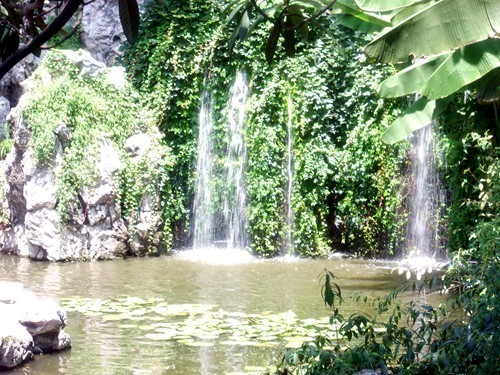
august 10, 2007
suzhou, china
i want to talk about gardens. and gardening. and life. my own. life and garden. and more geographically relevantly, suzhou’s gardens. one of the great national treasures of imperial and contemporary china. tucked just a few fertile miles upstream of shanghai, before the mighty and muddy yangtze curls and opens her wide, dragon-like mouth into the great pacific. you see, historically, the great, fierce, and warring chinese imperial dynasties always valued and invested in their beautiful and sumptuous gardens. as palaces and private kingdoms to entertain in. as tranquil and aesthetic sanctuaries to retreat into. and as vainglorious and massively-constructed landscapes to reflect and sustain their own mortalities within. witness the “summer palace” in northwest beijing. with its sprawling kunming lake, having been dug over decades by emperor qianlong’s 100,000 workers in the 18th century, no doubt preparing future chinese feudal laborers for their exploitation by the back and spirit-breaking american railroad, a century later. and in suzhou, witness the sprawling public and private gardens with strange, exotic, and confusing names like the “humble administrator’s garden”, the” lion’s grove garden”, the silently lyrical “lingering garden”, and one of smallest but most admired, the “master of nets garden”.
when i first moved to the house on lucretia in echo park where i’ve now been living for over 14 years, i used to consider myself a gardener. i used to climb down into all 8 levels of terraced hillside, endowed with more than 16 flowering and fruit-bearing trees, and i used dig and tear and cut and pull: weeds, soil, worms, and mulch. i had a compost heap. i’d recycle carrot and cucumber rinds, potato and banana skins, rotten tomatoes and old smelly refrigerator food, anything that could help enrich and grow my next year’s garden. i carried heavy gray-white limestone slabs down the old wooden stairway and laid them into the beautiful rich brown soil to create a white pebble-bordered footpath. i grew giant green summer zucchini, green, red, and yellow pepper, wild and delicious spinach, and best and easiest of all, sweet and satisfyingly hand-planted, home-grown tomatoes. i ate salads. and soups. i grew my own lettuces, broccoli, and arugala in winter. i made tasty zucchini-yogurt soup from my mom’s secret cook book recipe, and i was popular with all the neighbors because i had to give away all the fruit and vegetables i couldn’t eat. i liked the way it made me feel. how it connected me to the sky and the earth and to the season’s growing cycles. i liked standing out on the back, slatted-wood deck, under a clear, twinkling night sky, feeling connected to the great sweet milky way, and surveying my little plot of rented land. no, i still didn’t “own” my “own” little piece of land, but neither do any of us, according to our original north american forefathers, do we? so no, i wasn’t an emperor or a king, nor even a middle-class american homeowner; but still, somehow, i felt good, being somewhere between a proud and humble gardener.
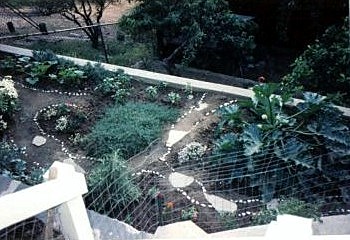
i say i “felt” and that i “used to be a gardener” because i haven’t gardened in years. i’m older, yeah. and my infamous, pre-replacement hip makes it harder too. but the one simple reason i don’t garden any more is that – i travel instead. “what?” you say. “why does one preclude the other?” and i say, “it’s the growing season, stupid.” think about it. when do most flowers and vegetables grow in sunny arid california? right……. summer. tomatoes? the growing season – may to september, if you’re lucky. same with petunias, string beans, and onions. sure, jasmine flowers in february, our state national flower, the wild-growing, california poppy, blooms in early spring, and bougainvillea and birds of paradise can blossom all year round; but me and the best of my gardening? i got my nails dirty and my back sore in the summer. now it’s the only time i can adventure and live in another culture for a sustained period of time. not “vacation”, like your 10 day to 2 week organized tour kind of travel, no; but your hit-the-road, follow your nose kind of travel i like to do for several months at a time. sort of eats up a lot of your “growing season”, if you catch my drift. but whereas you have to move your tomatoes upstairs into pots and ask your housesitter to keep them wet and alive while you’re away, and you have to forgo the many succulent pleasures of fresh zucchini-yogurt soup and home-grown, red-rich tomato summer salads, travel does alternatively provide you with such eye-opening and mind-expanding trips to exotic and fanciful places such as southeast asia, andalusian spain and morocco, to kathakali southern india, and at this very moment, to southeast pacific, china.
ah, here we are back in suzhou. we took one of those roundabout routes, like the way the actor studio’s lee strasberg would take ten minutes to answer a simple question about a scene he’d been watching, filling up the nine minutes and thirty seconds before with an entire history of russian and american theatre of the 20th century, all the famous people he knew, and lee, lee, lee, before he would mercifully, and mind-bogglingly, get back to giving you the answer you’d been looking for, all in the last, brutally honest thirty seconds. suzhou. “the venice of china”. canals. bridges. art. culture. sophistication. “one of the most beautiful cities of the orient,” according to marco polo, reporting back on his late 13th century travels along the ever-winding silk road from eastern turkey, across the vast mongolian gobi desert, into the court of great mongol, kublai khan. of course, hardly anyone believed old marco when he published his memoirs before he died, preferring to believe that he was instead exaggerating, imagining, or god forbid, simply making much of his adventures up in his own mind. ah, but we men of fortune and adventure are often falsely accused of mis-stating the truth, falsifying our claims, and of self-aggrandizing ourselves - in our reports back to “civilization”. what can say? read on, dear reader, at your own peril.
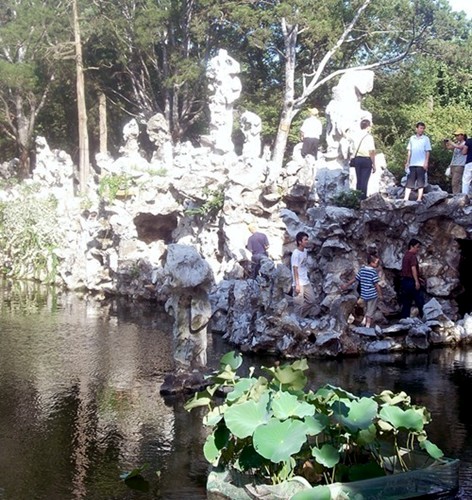
gardens. the chinese believe a perfect garden is one of both beauty and balance. sky (heaven) above, earth below. sight, sound, and smell. the alchemy between rockery, water, and all living things. the arrangement of plants, trees, and flowers. the sound of cicada. the song of the bird. the outer wall containing the entire universe within. (obviously before the glut of skyscrapers could be seen from anywhere within the city.) the chinese have these lovely poetic descriptions of their gardens: “the path among flowers is expressive of the love of guests.” and “whispering flower corridors recall yesterday and look forward to tomorrow.” and here, in jiangsu province, what is world-renowned is the “graceful, simple, unadorned, thought-provoking , weathered, but staunch, suzhou style.” people come from all over the world, the great majority being the chinese themselves, to see her many gardens, “plain in temperament, overflowing with imagination, and graceful in demeanor.” it is easy to see that these contemporary tourist traps originated from palace gardens and royal game enclosures, and that underneath today’s hordes of tour groups, competing families with terrorizing children, and over-crowded garden paths that require the sharp elbows of a yao ming, that at one time, these gardens “betrayed the character and spirit of the ancient ‘wu’ culture, where inspiration comes from green hills, meandering creeks, and level fields that bring together nature’s rustic serenity.”
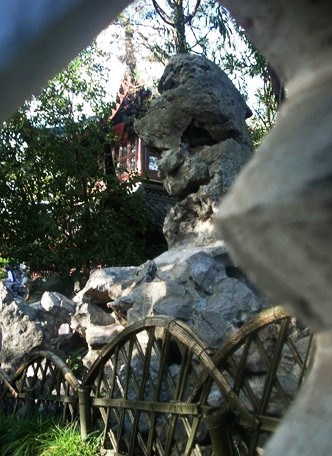
the chinese have this lovely concept of “borrowed view”, referring to the idea that same thing seen from a different vantage point is a “new” thing each time it is viewed. thus the reason for holes in walls, lattices in front garden scenery. to enhance and alter the view. look at a different angle, from a “borrowed view”, and to experience a new moment of peace, beauty, or serenity. every once in a great while, i try to eek out just a brief moment of such-said, but most evasive serenity, by climbing a “keep off the rock” sign (no self-respecting, politburo-believing chinese would ever break the law!), or by getting lost in a convoluted rock grotto maze, and for just that split second of garden serenity, i can understand what the old masters meant when they compared a perfect garden to crystallized poetry and to three dimensional chinese calligraphy and brush painting.
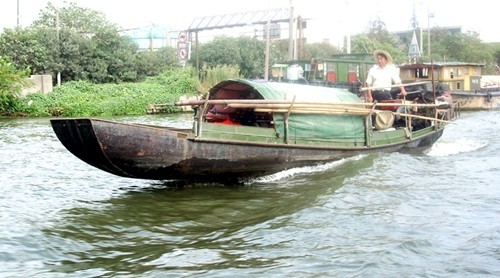
my second day in suzhou, i adventure by boat, 17 kilometers up the yangtze, to the small and charming, but still ready-for-tourists, old rural town of tongli. i’m the only gringo on the boat tour. i know this in advance, but there’s no other option. the tour guide speaks only chinese. they give me my tickets and collect my money in sign language. difficult? not really. fun. imagine going on a tour of the eiffel tower – in french. or on a tour of the statue of liberty – in english – if you were from – say – uzbekistan. what’s the point of traveling when a tour guide does all the navigating and all the decision making for you? you’re in a “foreign” culture. it’s supposed to be “foreign”. you’re supposed to have some difficulty. in translation. in understanding the language. in the customs. the people. in eating the food. try something NEW, for christ’s sake! get out of those hiltons. stop eating at those fucking mcdonald’s and KFC’s. it’s bad enough you do it in your own country. no pizza, godammit! you’re in china. eat chinese food. it’s good, believe me. at least, TRY IT! get lost! let go! you’re t-r-a-v-e-l-i-n-g!
so i get off the boat at tongli. i have a map. the tour guide and the tour group wait for me, patiently, as i hold up at the first stop. they’re not going in; i want to. it’s the pearl pagoda, site of one of the most famous love stories in all of chinese opera. the tour guide signals to me with her hand down, waving it back and forth. it looks like she’s saying “get lost”, but i know by this point in the trip, it means “come here”. the 30 person group stands waiting for me, smiling. “what a stupid gringo,” i know they’re all thinking simultaneously. i can read chinese minds by now. i smile back, and shake my head “no”. “i’m not going anywhere,” my head and face say clearly, or so i think. “in fact, i’m going in there. the pearl pagoda.” “no, no, no, stupid head, you’re coming with us. i have many more sites to show you.” “nope. i’m going in. pearl pagoda. i’ll be back here at 2 pm when the tour ends. i’ll see you in four and a half hours, 2 pm, ok?” i mime, pointing to my watch and holding up the appropriate number of fingers. she stares at me. the group waits. finally a young, pretty chinese girl comes up to me (they’re all pretty, dammit). she says, “what are you trying to say?” “you speak english?” i say incredulously. “a little,” she says shyly. “you speak very good english,” i say enthusiastically. “sank you,” she says. anyway, i explain and she translates, and that’s that. i’m on my own. until 2. pearl pagoda. chinese sex and culture museum….
oh yeah, i forgot to mention… that’s the reason i came to tongli, for the chinese sex and culture museum. the only one in the country. apparently booted out of shanghai a few years ago, this world-famous museum is the only place in all of communist china that you can see that chinese men have dicks and chinese women have pussies. i follow my map, into the maze of tonglian streets that will lead me to the forbidden sweet spot of china. along the way, from the pearl pagoda though, i discover a chinese man sitting on the side of the river, playing an ancient 3 stringed sanxian. he’s ancient looking himself with a long wispy white beard, and he looks like a caricature from an old charlie chan movie. but he’s real. i sit down a few feet away and listen to him. he shifts his eyes to include me and continues his musical reverie.
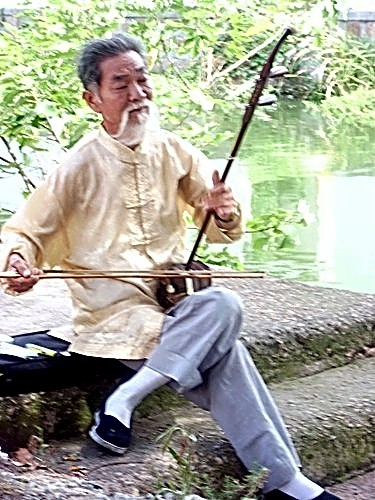
it’s a private concert along an estuary of the yangtze. oh, what a lucky man, me thinks. the tourists are touring, and i’m being entertained by the great grandfather of charlie chan. he stops after a few more moments, smiles, and reaches to his chest. he pulls out a box of cigarettes, pats out two, and offers me one. i smile and shake my head, no, hoping i’m not offending him. he lights up and we sit a few more minutes together. i get up and continue on my quest.
a few minutes later and i’m in. to the sex and culture museum. the beckoning courtyard greets me with a bigger than life-size statue of an oafish looking man in chains proudly displaying his 10 foot long, erect penis.
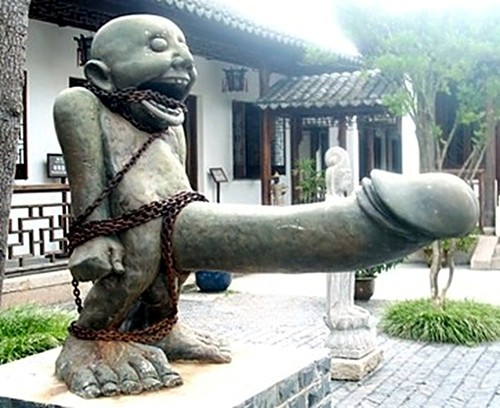
whoah! who said asian dudes had small dicks! i proceed. there’s more. buddha and his consort getting it on. detailed paintings of chinese men and woman – having – sex. three ways. blow jobs. anal intercourse. it’s a sex museum alright. there’s a special dildo exhibition. with sanitized academic explanations of their usages. “what with the emperor having to service so many concubines each night, sometimes these artificial phalluses were put to good use.” and “other times they were used to great effect by the court’s eunuchs.” of course, why didn’t i think of that? then there’s an old leather saddle with a huge protruding phallus coming out of its seat. its usage? “to punish errant woman at the emperor’s discretion.”
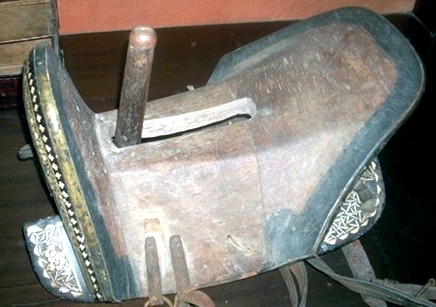
oh, i see. and the explanatory text accompanying the foot binding exhibit? “to keep women’s feet small enough so that they would stay around the home in service to the men of the clan.” you catch the drift. asian woman, once again, subjugated by the patriarchal feudal code. nothing new, eh? just nicely put in context on display in the chinese sex and culture museum. how ‘bout this one?
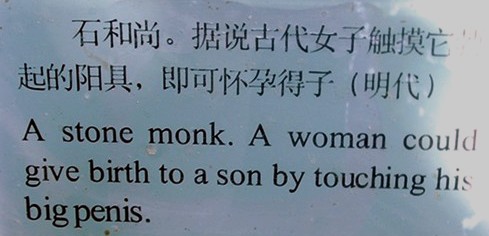
can you read it? next to a large granite sculpture looking like a naked friar tuck, it says: “a stone monk. a woman could give birth to a son by touching his big penis.”
yes, the world has come far over the course of the millennium….
all this and more in the gardens and tea houses of tongli.
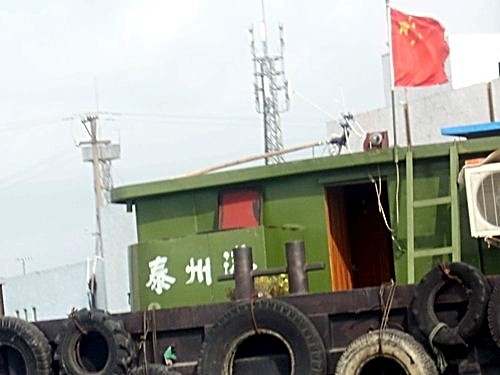
i get back on the boat at the appointed 2 pm. the tour guide and my tour group are glad to see me. the air conditioner is on in the cabin, and we speed back to suzhou.
sorry for the sex and culture tangent. it’s hard not to get lost up one of the great river’s minor estuaries. a little like one of lee’s long winded, tangential, narcissistic scene question answers.
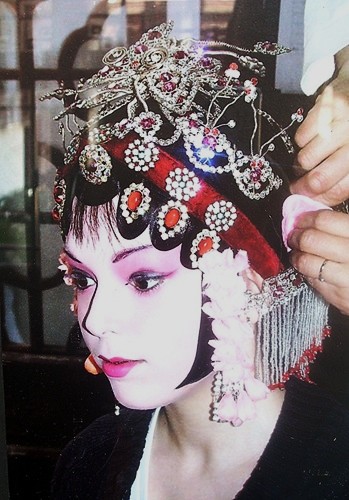
for my third and final day, i plan to take in as many of suzhou’s classical gardens that i haven’t seen as i can, along with the brand new suzhou museum, post-modernly designed by suzhou’s very own, world famous architect, mr. i. m. pei. and then there’s the kunqu opera museum, a must see, since i’m a university theatre professor and kunqu is the local style of chinese opera that even pre-dates the peking opera. and right down the street from the kunqu, is the pingtan museum with a live daily performance at 1:30 pm, which the guide book swears is in an authentic century-old tea house and is attended not by gaping tourists, but by actual local suzhou-ans, mostly over the age of 50 or 60. sung in the classical, comic, two character, call and response, storytelling style... with traditional chinese instruments. absolutely not to be missed. and then there’s tiger hill, and the twin pagodas, and the….
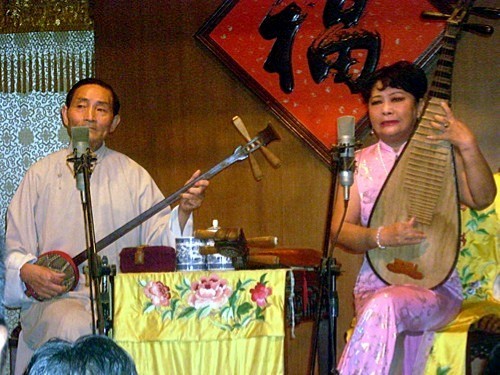
and i suddenly realize – that putting a day together… putting a visit together…. putting a travel itinerary together… is something like putting a garden together. you simply can’t have everything in a single garden. you have to make choices. put combinations and textures together. a garden is considered beautiful as much by what is left out, as by what is put in. it’s not how crowded or complete the garden is, it’s how perfectly balanced and composed it is. rockery. water. live plants, trees, and flowers.
similarly, you simply can’t see everything, do everything, in a single city. in a single country. on a single travel adventure. in a single lifetime. there’s always more. more to see. more to do. for example you’re in cairo. how about shouk in the central market place? “you didn’t see that? you’re kidding? you mean you missed the shouk?” or in roma, italie. at the vatican. “what about the frescoes in the northwest corner of the sistine chapel? you mean you missed those? how could you? they were incredible! unbelievable! you mean you missed them?” “yeah, i missed them. in fact, i could have seen them, but i didn’t.” “whatayamean? are you crazy? those were the most incredible frescoes….” “yeah, i know they must have been. but i just couldn’t.” “whatayamean, ya couldn’t? you coulda…” “no, i mean, i didn’t want to. i didn’t have enough time. i was tired. i wanted to come back and rest.” “whatayamean? you coulda stayed another day. changed your plans. you coulda…” “but i didn’t want to. i didn’t want to change my train reservation. i just wanted to come back and rest.”
and so it goes. a trip is like a meal is like a garden. it all comes down to choices. what are you going to take in? what are you going to leave out? are you going to appreciate all that you experienced and chose? or are you going to fret and regret over all that you missed? half full or half empty? is your meal good enough with just the perfect combination of soup, salad, entrée, and glass of wine? or do you need the smorgasbord and the desert platter. have you learned that less is more, as mr. i. m. pei has, or are you still of the more is better persuasion? do you eat until your stomach feels it’s bursting, as i did when i was a young man, or do you take a lovely balanced amount of colors, textures, and tastes, and are you satisfied with that?
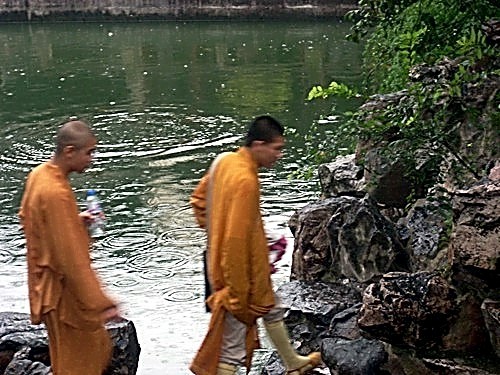
it’s an ongoing struggle, the balance dance. creating a garden out of your life. not eating everything on the table. letting some things go, some people go, some opportunities go. you can’t see everything in stockholm. monte carlo. even tongli. so here i am in suzhou, and there’s only time for the garden of humble administrators at 10, the kunqu museum at noon, the pingtan show in the ancient teahouse at 1:30, and the new suzhou museum from 3:30 to closing, courtesy of mr. i. m. pie, whose family, by the way, used to live in what is now, the “lion’s grove garden”. “it’s all…. connected”, i hear a little sparrow say, on her way from plum blossom to plum blossom. looks like i’ll have to miss the master of nets garden and linger at the “lingering garden” the next time i’m in suzhou. knowing quite well, that of course, there will probably never be “a next time in suzhou.” but then again, as the fat man, mr. waller, always sang, “one never knows, do one?”
as i gather my things from the hotel early the next morning for my last train ride from suzhou to shanghai, i’m still trying to figure out why it’s called the “garden of humble administrators”. my first chinese adventure is almost over. just three days left in shanghai. then, as i pile a few of my many suzhou-tongli brochures together: the kunqu museum and pingtan teahouse show brochures, the entrance ticket to the ancient city of tongli, the suzhou museum ticket… i come across it. it’s just a few lines in the “humble administrators” brochure. it’s written by the humble administrator himself, a former high-ranking city official who retired from his job early, before his time was due. when asked “why” by incredulous friends and foes alike, he replied simply, “to cultivate my garden and sell my vegetable crop, is the way of the humble man.”
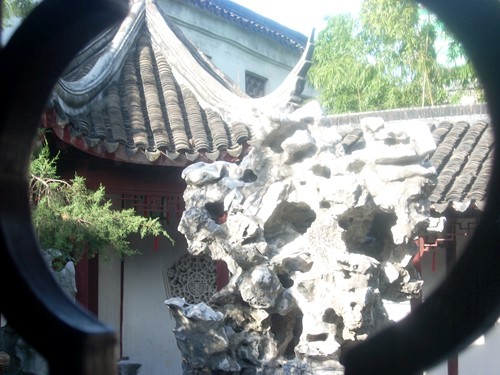
i think when i get back to LA, i’m going to climb down those old wooden steps again, into those beautiful 8 terraced levels of arid california soil, and i’m going to get my hands dirty, and my legs sore. i’m going to “borrow” a view from suzhou, and see if i can look at things anew at 60. and then i’m going to bend down and re-plant some of those juicy red salad tomatoes right there in the back yard of my sweet home lucretia garden.
much luv from suzhou,
(chauncey) gardener trules
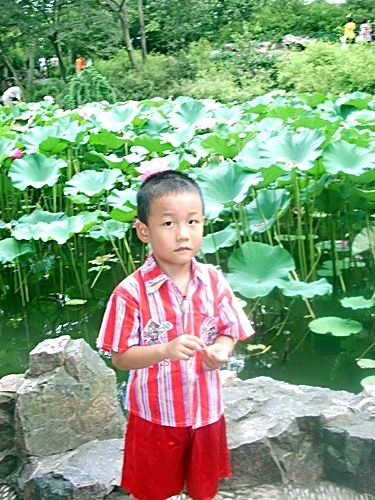
![]()